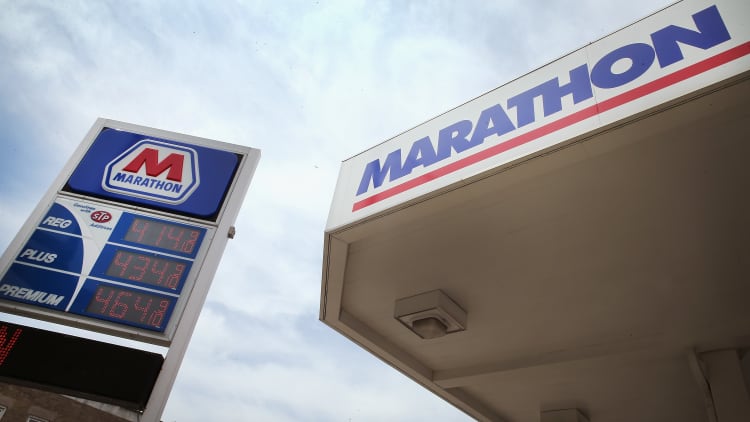Travelers wait to check in at the Southwest Airlines counter at Oakland International Airport in Oakland, California, Dec. 27, 2022.
David Paul Morris | Bloomberg | Getty Images
After Elliott Management revealed a $1.9 billion stake in Southwest Airlines in June, an initial rally in the stock quickly fizzled. Rather than sparking typical cheer on Wall Street, Elliott’s campaign, spelled out in a 50-page presentation, led to confusion and concern among investors and customers.
The hedge fund has taken activist stakes in more than 140 companies over the past three decades, according to data from 13D Monitor, but, like most activist investors, it has never targeted an airline.
Southwest, a Dallas-based company that started flying in 1971, has a unique culture that’s survived profitably for decades in a bruising industry.
While the company is suffering from margin deterioration and has seen its stock drop in each of the past four years, Elliott’s demand that Southwest fire CEO Bob Jordan and oust Chairman Gary Kelly has raised questions about whether the activist fully understands Southwest’s insular culture and the industry’s glacial pace of change.
Elliott hasn’t publicly specified changes it wants within Southwest’s offerings, calling instead for a business review.
“We are not entirely sure what Elliott has in mind,” analysts at Melius Research wrote in a report on June 10, the day the firm launched its campaign. “Until we know more, we are sticking with our Sell rating.”
Southwest has taken steps to defend itself. On Wednesday, the airline adopted a so-called poison pill that would activate if any shareholder acquired an interest of more than 12.5%, limiting Elliott’s ability to attain more control. Elliott says it currently has an interest of about 11% of the company.
Despite the potential wrinkle introduced by Southwest’s latest move, history offers some clues as to how this will play out. Several activism experts pointed to two of Elliott’s past targets for insight into the hedge fund’s strategy for Southwest: Suncor Energy in 2022 and Marathon Petroleum in 2019.
Elliott partner John Pike, who is now leading the Southwest campaign, was involved in the firm’s actions at both energy companies. While Suncor and Marathon resisted Elliott’s proposals, including leadership change and business reviews, Elliott still got much of what it wanted.

Elliott’s activist practice has helped it become one of the most successful hedge funds in the world, surpassing $65 billion in assets. The firm, which moved its headquarters in 2020 from New York to West Palm Beach, Florida, has only had two losing years in five decades. It often pushes companies to make dramatic changes, such as selling off businesses, firing executives or abandoning strategic plans.
In recent years, however, Elliott has also shown it can work collaboratively with management. Representatives have joined the boards of companies including Pinterest and Etsy. Texas Instruments CEO Haviv Ilan said in May that his company was open to “constructive dialogue” with Elliott, and Salesforce CEO Marc Benioff said he had “thoroughly enjoyed getting to know” the Elliott team after the firm dropped plans to nominate directors at the software company in 2023.
Southwest said in a brief response to Elliott’s presentation that it’s “thoughtfully reviewing” the June 10 letter from the hedge fund and looks forward to “further conversations with Elliott.” Southwest also said it’s confident in its strategy and its team and is “focused on restoring our industry-leading financial performance.” Jordan said he has no plans to resign.
Pike and portfolio manager Bobby Xu are leading Elliott’s Southwest campaign. Elliott and Southwest representatives met in person in Dallas two weeks ago, according to people familiar with the matter. The discussions remain in the early stages, said the people, who asked not to be named because the conversations were private.
The airline has tapped Bank of America and law firm Vinson & Elkins to advise it, another person familiar with the situation said.
Southwest shares are down slightly since Elliott announced its involvement, despite a 7% jump on the day of the disclosure. They fell 5.7% on Friday to close at $26.94.
Southwest did not provide a comment for this story.
A sprint and Marathon

In April 2022, when Elliott revealed a stake in Suncor, it pointed to a culture that had become overly bureaucratic, leading to an operational slump and a string of worker deaths under CEO Mark Little.
“We have considerable respect for Suncor,” Elliott’s Pike wrote, in calling for management review.
Investors were initially wary of Elliott’s demands, which included selling off Suncor’s Petro-Canada gas stations.
Little pushed back initially, but his boardroom support evaporated when another worker was killed weeks after Elliott announced its stake. Little resigned, and the Canadian company soon struck a deal with Elliott, offering three board seats to the hedge fund and conceding to a strategic review — meaning a potential sale — of its Petro-Canada gas stations.
It was a middle-of-the-road resolution. The company decided after the review not to sell its Petro-Canada business. But it also brought in as CEO an outsider, in longtime Exxon Mobil executive Rich Kruger.
At Southwest, Elliott sees a top job that would be similarly appealing to industry executives from other airlines, according to a person familiar with the firm’s thinking.
A Suncor Energy facility in Sherwood Park, Alberta, Canada, Aug. 21, 2019.
Candace Elliott | Reuters
While its Suncor effort ended in a relatively quick victory, Elliott’s experience with Marathon highlighted the firm’s willingness to be patient.
Elliott first amassed a stake in the oil producer in 2016 and asked Marathon to “evaluate” breaking up the company. Like Suncor, Marathon ran a review and opted to stay intact, keeping its Speedway gas stations as part of the business.
But in 2018, a few months after reaching an agreement with Elliott, Marathon announced it was only getting bigger. The company agreed to buy rival Andeavor in a $23 billion deal.
Elliott responded to what it viewed as a broken promise by reviving its activist campaign in 2019, picking up a new 2.5% position and proclaiming that it would make sure the “right leadership” was in place.
“While the Company assured shareholders that it was pursuing a full review of the Speedway business, it had a different agenda entirely,” Elliott’s Pike wrote in the 2019 letter.
Weeks later, Marathon’s board said CEO Gary Heminger would retire and that the company would finally spin off Speedway. Elliott reportedly insisted the board find an outsider to replace Heminger.
In March 2020, Marathon hired 38-year industry veteran Mike Hennigan as CEO. Speedway was sold to 7-Eleven’s parent company for $21 billion in 2020, months after Hennigan took the post, and the company later announced a $7.1 billion buyback program.
Years after its victories at Marathon and Suncor, Elliott remains a top five shareholder at both companies.

Elliott is now one of the top investors in Southwest. One major shareholder, Artisan Partners, has expressed its support for Elliott’s campaign. Southwest’s bylaws allow big shareholders to call a special meeting to replace its board, something Elliott could consider doing further down the road, though the firm hasn’t said if it plans to mount a proxy fight.
Whether or not shareholders decide to back Elliott’s push, history shows they will benefit. Elliott-targeted companies tend to outperform the market, according to a 13D Monitor analysis. The hedge fund holds on to its positions for two years on average, according to the data. Elliott said its plan can help Southwest’s share price jump 77% in 12 months to $49.
The poison pill Southwest introduced this week could complicate matters. It’s normally adopted by companies fending off a takeover bid. In this case, it limits Elliott’s ability to amass more control and also suggests that Southwest’s management isn’t interested in rolling over.
In the press release announcing the plan, Kelly said the airline “remains open to any ideas for lasting value creation” but said adopting the poison pill was part of the board’s “fiduciary duties to all shareholders.” The measure would allow all shareholders, “other than the person or group triggering” the plan, to buy stock at a 50% discount to the market price if any person or group acquired 12.5% or more of the company’s outstanding stock.
Elliott, which has dealt with poison pills in the past, hasn’t made clear where it plans to go with its campaign. The firm isn’t currently pursuing specific changes that would affect things such as Southwest’s baggage policy, according to a person familiar with its plans. Southwest is the only domestic carrier that allows every passenger to check two bags for free, a major customer perk, particularly for those who fly with family members.
But a refreshed board and business review could lead to scrutiny of some of Southwest’s popular offerings.
Union challenges
There are some key differentiating factors for Southwest when compared with Suncor and Marathon. For one, Southwest hasn’t made a notable acquisition since 2011 and doesn’t have any adjacent businesses to spin out.
Another potential hurdle is union influence, which makes it harder for management to implement significant changes, particularly when they involve layoffs and other cost cuts. More than 80% of Southwest’s employees belong to a union, and there are separate organizations for pilots, flight attendants and mechanics. In all, workers are represented by at least 11 unions, according to the airline’s website.
Leadership from the 11,000-member Southwest Airlines Pilots Association met with the Elliott team in Dallas in June. The group conducted an “in-depth analysis” on Elliott’s “actionable plans and timelines,” labor leaders said in a message obtained by CNBC.
“In very simple terms, this has the potential to be one of the most significant events in Southwest Airlines’ history,” SWAPA leaders wrote of the activist campaign.
Southwest has previously acknowledged some of the problems Elliott highlighted, including system failures that led to thousands of cancellations and left millions of passengers stranded during the 2022 winter holidays.
But financial challenges persist. Last week, Southwest cut its second-quarter revenue forecast. The company cited “complexities in adapting” its business to “current booking patterns in this dynamic environment.”
According to Elliott, it’s all part of a pattern that justifies activist intervention.
“Southwest is led by a team that has proven unable to adapt to the modern airline industry,” Pike and Xu said in a statement. “This is yet another example that fundamental leadership change is urgently needed at Southwest.”
— CNBC’s Leslie Josephs contributed to this report.


